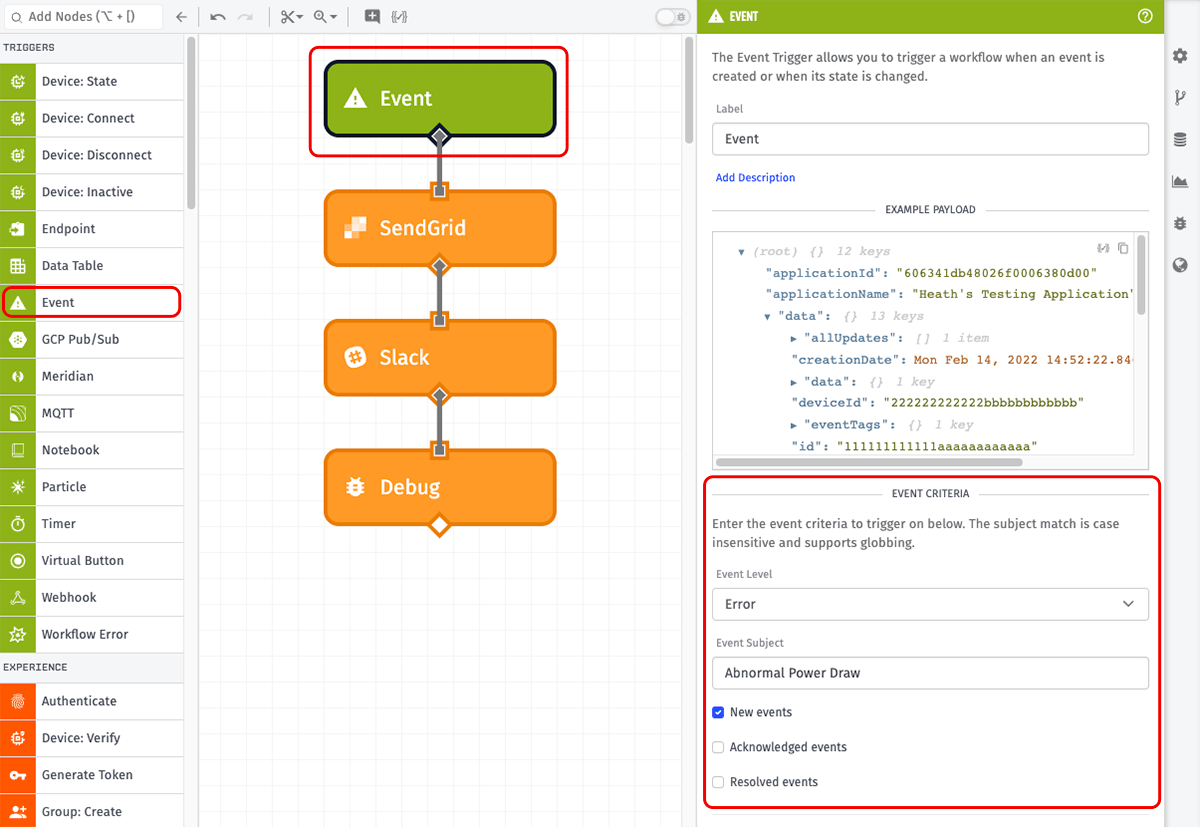Event Trigger
The Event Trigger fires a workflow whenever an event matching the criteria defined in the trigger’s configuration is created or changes state.

Node Properties
There are three configurable criteria for matching events…
Event Criteria
- Event Level: The “level” of the event, with levels of Any, Info, Warning, Error, and Critical. The Any option will fire the trigger for an event of any level.
- Event Subject: The “subject” of the event. Event subjects use case insensitive matching, with support for globbing. Leaving this field blank will cause the trigger to fire for any subject.
- State: The “state” of the event, with the options of New (or reopened), Acknowledged, and Resolved.
In the above example, the workflow will be triggered whenever an event is created or placed in the “new” state with an Event Level of “Error” and has the subject “Abnormal Power Draw”.
Payload
The payload will include information about the event on the data field, as well as the standard workflow payload information. In the general case, an Event Trigger workflow payload will look like the following:
{
"applicationId": "555555555555eeeeeeeeeeee",
"applicationName": "My Great Application",
"data": {
"allUpdates": "<array of all updates to this event>",
"creationDate": "<creation date of the event>",
"data": "<structured data attached to the event>",
"deviceId": "<ID of the device associated with this event>",
"eventTags": "<object of tags associated with the event>",
"id": "<ID of the created/updated event>",
"latestUpdate": {
"creationDate": "<creation date of the latest update to the event>",
"sourceId": "<ID of the source that updated the event>",
"sourceName": "<name of the source that updated the event>",
"sourceType": "<apiToken|flow|user|experienceUser|public>",
"stateChange": {
"new": "acknowledged",
"old": "new"
}
},
"level": "<critical|error|warning|info>",
"message": "<message included in the event creation>",
"sourceId": "<ID of the source that created/updated the event>",
"sourceType": "<apiToken|flow|user>",
"state": "<new|acknowledged|resolved>",
"subject": "<subject of the event>"
},
"flowId": "333333333333cccccccccccc",
"flowName": "My Great Workflow",
"flowVersion": "myFlowVersion",
"globals": {
"aJsonGlobal": {
"key": "value"
},
"aNumberGlobal": 42,
"aStringGlobal": "My value"
},
"relayId": "<ID of the resource that created/updated the event>",
"relayType": "<apiToken|flow|user|experienceUser|public>",
"time": Fri Feb 19 2016 17:26:00 GMT-0500 (EST),
"triggerId": "<any|error|critical|warning|info>",
"triggerType": "event"
}data.deviceIdis the ID of the device that is associated with this event. This field will beundefinedif a device is not associated with this event.triggerIdwill be the level the Event Trigger is set to trigger on. For example, if the Event Level is set toAny Level, this field will be"any".relayIdanddata.latestUpdate.sourceIdwill match when an event is updated.relayTypeanddata.latestUpdate.sourceTypewill match when an event is updated.data.sourceTypeanddata.sourceIdare the original source that created the event.data.datais any additional data that you included with the event. If no additional data is included, this field will beundefined.data.latestUpdatewill beundefinedfor new events, but includes the above information when an event is updated.data.sourceTypeofpublicmeans that an event was created or updated by an unauthenticated Experience User or through a Public Dashboard.
Related Nodes
Was this page helpful?
Still looking for help? You can also search the Losant Forums or submit your question there.
